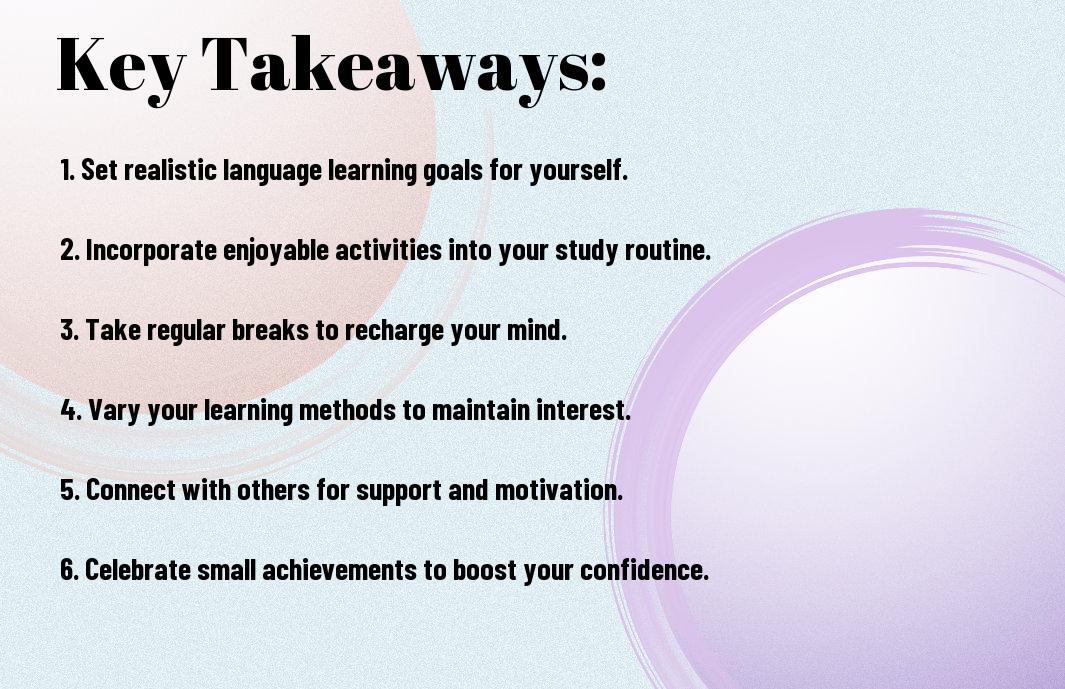As you commence on your language learning journey, you’ll likely encounter moments of frustration and exhaustion. Your progress may slow, and you may feel like giving up. You’re not alone in this feeling – many language learners face burnout at some point. By recognizing the signs of burnout and taking proactive steps, you can maintain your motivation and continue making progress towards your language goals, ensuring a successful and enjoyable learning experience.
Key Takeaways:
To maintain a healthy and productive language learning journey, consider the following points:
- Set realistic goals and prioritize your tasks to avoid overwhelming yourself with too much information at once, allowing for a steady and manageable progress.
- Establish a consistent routine that incorporates regular breaks and time for relaxation, helping to prevent mental exhaustion and maintain motivation.
- Focus on enjoyable activities, such as reading, writing, or conversing with native speakers, which can make the learning process more engaging and reduce the risk of burnout.
Setting Realistic Goals
The key to avoiding burnout when learning a language is to set realistic goals. You need to understand your learning capacity and set achievable targets. This will help you stay motivated and focused on your language learning journey. By setting realistic goals, you can track your progress and make adjustments as needed.
Breaking Down Language Barriers
After overcoming the initial hurdles, you’ll find that learning a language becomes more manageable. You’ll start to notice improvements in your comprehension and communication skills, which will help you stay engaged and motivated. Your progress will be a significant confidence booster, encouraging you to continue learning.
Creating Achievable Milestones
Meanwhile, milestones serve as a roadmap for your language learning journey. You can break down your long-term goals into smaller, achievable milestones, making it easier to track your progress. This approach helps you stay focused on what you need to accomplish, allowing you to make steady progress towards your goals.
Hence, creating achievable milestones is an necessary part of the language learning process. You can start by identifying specific skills you want to develop, such as conversational fluency or reading comprehension. Then, you can set milestones based on these skills, allowing you to measure your progress and adjust your strategy as needed. By doing so, you’ll be able to stay motivated and engaged throughout your language learning journey.

Establishing a Learning Routine
It is imperative to create a schedule that allows you to make consistent progress in your language learning journey. By allocating a specific time slot each day or week, you can ensure that you stay on track and make steady progress.
Scheduling Language Practice
Between your daily tasks and activities, you need to find a balance that allows you to dedicate time to language practice. You should identify the most suitable time of the day that works best for your learning style and schedule it accordingly.
Prioritizing Consistency
Above all, maintaining a consistent learning routine is vital to avoiding burnout. You must prioritize your language learning goals and make sure that you stick to your schedule, even on weekends or days off.
A key aspect of prioritizing consistency is to set achievable goals and celebrate your progress along the way. As you track your progress, you will be motivated to continue learning and stay committed to your routine, which will help you avoid burnout and achieve your language learning objectives.

Mindfulness and Self-Care
Keep your mental and physical well-being in check by prioritizing mindfulness and self-care when learning a language. This helps you stay focused and motivated, reducing the risk of burnout.
Recognizing Burnout Signs
Burning out can be detrimental to your language learning progress, so it’s imperative to identify the signs, such as fatigue, anxiety, and lack of motivation, and take action to prevent them from taking over your learning journey.
Practicing Relaxation Techniques
Practicing mindfulness techniques, such as meditation and deep breathing, can help you manage stress and maintain a healthy work-life balance, allowing you to approach language learning with a clear and focused mind.
SelfCare is imperative when practicing relaxation techniques, as you need to listen to your body and mind, and take regular breaks to recharge and refocus, enabling you to make steady progress in your language learning journey, and you can try various techniques, such as yoga or progressive muscle relaxation, to find what works best for you.
Language Learning Strategies
To avoid burnout, it’s important to have effective language learning strategies in place. You can achieve this by setting realistic goals, tracking your progress, and staying consistent. By doing so, you’ll be able to maintain motivation and make steady progress in your language learning journey.
Immersive Techniques
With the help of technology, you can surround yourself with the language you’re learning, making it easier to pick up. You can listen to music, watch TV shows or movies, and even change your phone settings to the target language, allowing you to learn passively throughout the day.
Active Learning Methods
About the most effective ways to learn a language, you’ll find that active learning methods are at the top of the list. You can practice speaking with a language exchange partner, engage in writing exercises, or participate in conversations with native speakers, all of which will help you improve your language skills quickly.
Also, as you explore active learning methods, you’ll discover that they not only improve your language skills but also help you stay motivated and engaged. You can try out different methods to find what works best for you, whether it’s taking a class, using language learning apps, or participating in language learning communities, and adjust your approach as you progress in your journey.
Building a Support Network
Not having a support network can make language learning a solitary and daunting task. You can build a network by finding language exchange partners, joining language learning communities, and connecting with fellow learners who share your goals and interests.
Finding Language Exchange Partners
To take your language skills to the next level, you can find language exchange partners who can practice with you, provide feedback, and help you stay motivated. You can find them through language learning apps, social media, or local language meetups.
Joining Language Learning Communities
Before you start your language learning journey, you can join online communities, forums, or social media groups dedicated to language learning. You can connect with other learners, ask questions, and learn from their experiences.
Considering the benefits of joining language learning communities, you can explore different options, such as online forums, social media groups, or local meetups, to find the ones that suit your needs and preferences. You can participate in discussions, share your progress, and get feedback from others, which can help you stay motivated and accountable throughout your language learning journey.
Overcoming Obstacles
All language learners face obstacles, and it’s how you overcome them that matters. You can find helpful tips on dealing with burnout by visiting Overwhelmed? 5 Ways to Deal with Language Learning Burnout to help you stay on track.
Dealing with Frustration
Across the language learning journey, you will encounter setbacks, but acknowledging your emotions is key to moving forward. You can take a break, reassess your goals, and adjust your strategy to overcome frustration.
Staying Motivated
Above all, maintaining motivation is crucial to achieving your language learning goals. You can celebrate small victories, set achievable milestones, and find a language learning buddy to help stay motivated.
Considering your motivations and goals, you can develop a personalized plan to stay motivated and engaged throughout the language learning process. You can explore different learning materials, join online communities, and track your progress to maintain a positive and motivated mindset, helping you to overcome obstacles and achieve your goals.
Summing up
With this in mind, you can now take control of your language learning journey and avoid burnout. You have the tools to set realistic goals, prioritize self-care, and maintain a balance between practice and rest. By being mindful of your limitations and taking regular breaks, you can preserve your motivation and make steady progress in learning your target language, ultimately achieving your goals and enjoying the process. Your dedication and awareness will help you stay on track.
FAQ
Q: What are the signs of burnout when learning a language, and how can I identify them early on?
A: Burnout when learning a language can manifest in various ways, including a lack of motivation, decreased interest in activities related to the language, and physical symptoms such as headaches or fatigue. To identify these signs early, pay attention to your mental and physical state. If you find yourself consistently feeling overwhelmed, struggling to concentrate, or experiencing a significant decrease in your usual enthusiasm for language learning, it may be a sign of burnout. Recognizing these signs early allows you to take proactive steps to address the issue before it severely impacts your learning progress.
Q: How can setting realistic goals help in preventing burnout when learning a language?
A: Setting realistic goals is a significant factor in preventing burnout when learning a language. By having achievable targets, you can maintain a sense of accomplishment and progress, which helps in keeping your motivation levels high. Unrealistic expectations can lead to frustration and disappointment, which are precursors to burnout. Break down your language learning journey into smaller, manageable milestones. This approach will not only make your goals feel less daunting but also provide you with a clear roadmap to follow, ensuring that you stay focused and motivated without overexerting yourself.
Q: What role does taking regular breaks play in avoiding burnout during the language learning process?
A: Taking regular breaks is important for avoiding burnout during the language learning process. Continuous study without adequate rest can lead to mental exhaustion, decreased productivity, and a higher risk of burnout. Regular breaks allow your mind to rest and rejuvenate, which can improve your focus and retention when you return to studying. Additionally, breaks can be used to engage in activities unrelated to language learning, providing an opportunity to relax and reduce stress. Incorporating breaks into your study routine can help maintain a healthy balance between learning and rest, ultimately supporting a sustainable and effective language learning journey.